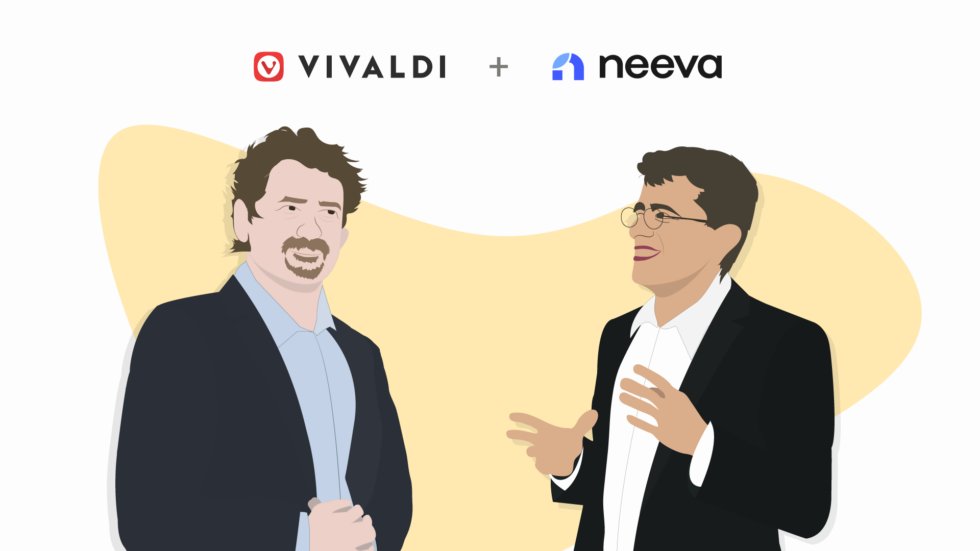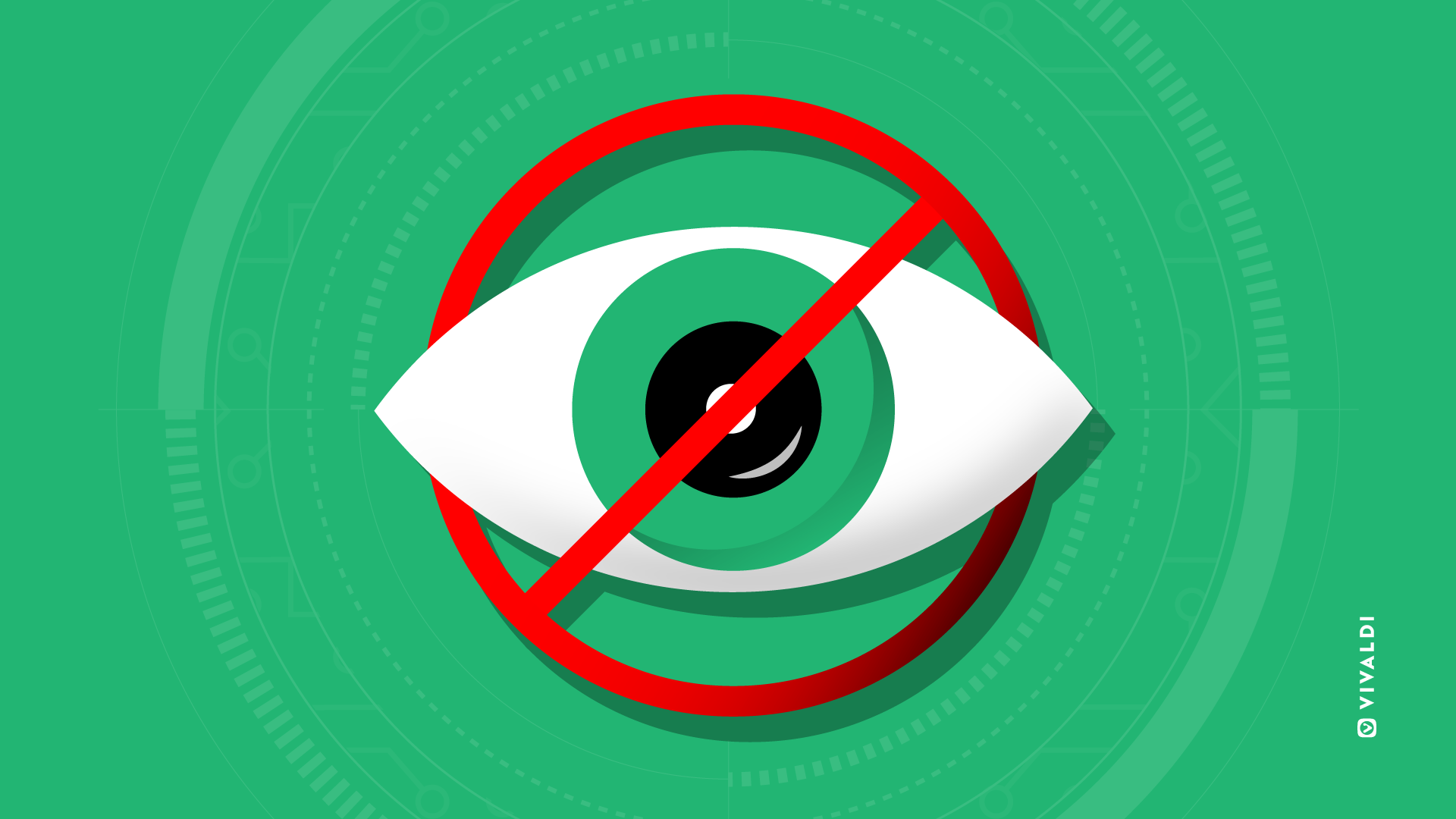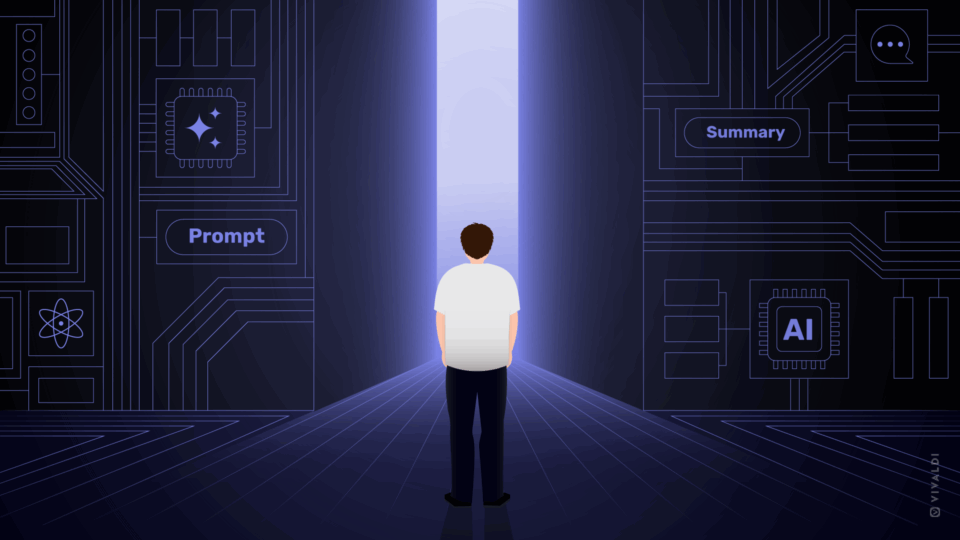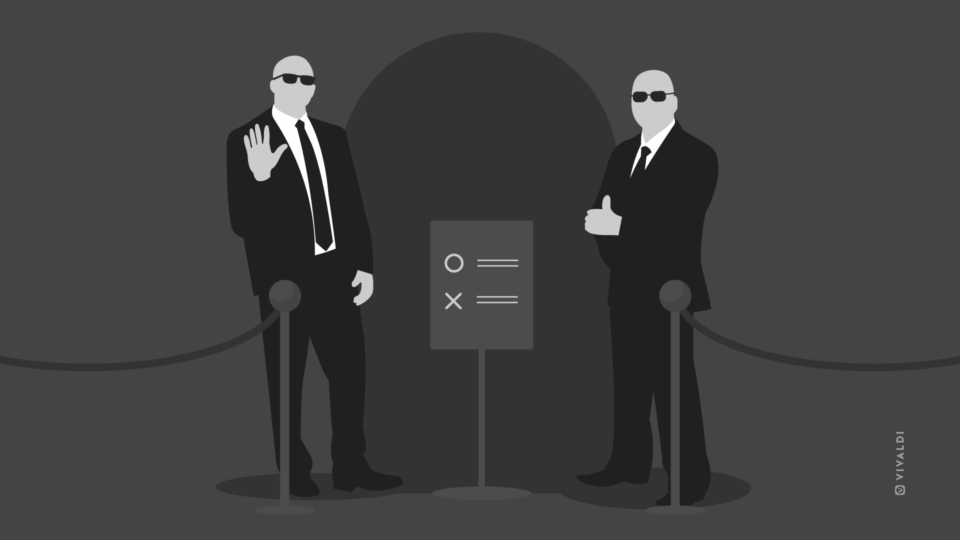
Read this article in Deutsch.
What happens when you take two great internet innovators and put them together? Fresh insights about how to move us past the age of tracking, overcoming Big Tech monopolies, and what drives them both to envision and innovate toward a new and better way for everyone on the internet.
We’re sharing the chat as a browsercast on SoundCloud, so you can hear the full discussion in Jon’s and Sridhar’s own words. Please note that the chat took place across three time zones, recorded in homes rather than studios.
About the CEOs
Jon von Tetzchner is the Co-Founder / CEO of Vivaldi, the most privacy friendly and customizable browser. Jon has been shaping the internet through browser development and leadership since 1994. He currently resides in Massachusetts.
Sridhar Ramaswamy is the Co-Founder / CEO of Neeva, the only ad-free private search engine. An ex-SVP for Ads at Google, Sridhar is applying his extensive internet experience to reimagine search for users. He is based in California.
Highlights from the conversation
Q: Tracking has gotten out of hand. How do we tackle it?

Sridhar: On a micro level, the internet has made it incredibly hard for the average person to tell what is real and what is fake. I think there is massive erosion in trust that is very pervasive.
The internet has made it incredibly hard for the average person to tell what is real and what is fake.
Sridhar Ramaswamy
The second part is that a few companies dominate the internet. Companies are about profit. So when problems happen, when there are issues with civil society, you see a lot of reluctance on the part of the companies.
This massive centralization of resources, of just the sheer number of dollars, in a few companies is the other troublesome aspect. I think the divide between the haves and have nots is much worse, and the tech companies have amplified that.
Jon: We were on a really good path until sometime around 2010-2012, when things changed. There are a few companies that misused their power. They took data that was being collected on people. Now whatever service you are providing, there will be data in your system. The question is how you deal with that data. Do you treat it as something that should be protected? Or do you use it to build profiles on your users?
There was always a lot of really bad stuff on the internet, but you wouldn’t find it without the algorithms that would actually send you that data. So in some ways the algorithms that were optimized, probably with the best intentions at times, to show you relevant content and the like ended up showing you the bad content. And optimized for a system where you would gradually get worse and worse content over time. And then the same was combined with advertising. It’s a mix from hell that’s created a lot of damage.
One of the things that I do is to speak up about this and say, “Hey, we have a problem here.” We will tell anyone that wants to listen that we have a problem that needs to be regulated.
It’s taken a bit longer than I had hoped for. It takes time for people to understand the power of these algorithms and how they work, and it takes time for them to realize you can’t really fix it by doing little things. You have to regulate the use of data to put the genie back in the bottle.
People talk about data as the new oil. I think it’s actually a very correct term because it’s destroying our planet
People talk about data as the new oil. I think it’s a very correct expression, because it’s destroying our planet.
Jon von Tetzchner
So the first thing for us as a company is not collecting data ourselves. And working with various like minded companies. Because, in the space of a few years, we have seen so much damage. We are seeing more and more people stepping up and saying “Hey, enough is enough. We need to change this. This needs to stop.”
Sridhar: A foundational principle that we had, when we were thinking about Neeva, was that privacy needs to be rethought. If you are going to interact with a site, you have an account with them. The site knows you have an account with them; you’re logged in. That’s not tracking; you’re just interacting, first-party interaction with somebody. On the other hand, do 2000 other companies need to know you went to a certain page on New York Times or CNN or any other site? Absolutely not.
Many companies that have started in the last 20 years essentially had this viewpoint that all data was good, and the more data was collected, the more option value. So this made us think, “What is the barest minimum of data we need to have on the user to create a great experience for the user? And how do we make sure they feel that they are in charge of their experience?” It’s a simplified privacy model.
I think there’s a lot of pressure to remove tracking, but I think there needs to be accompanying regulation, because if we simply put pressure just at the browser level, everything will move server-side, where none of us have any insight about anything that happens.
Jon: I remember the early days where if you had certain information on your customers, you wouldn’t see it shared with someone else. To me, where it went totally wrong is where companies decided, “Hey, we don’t have to follow that rule”. Just because Google or Facebook and others have all these underlying agreements with multiple companies doesn’t mean that the data that you as a customer have with that company is something that they should have access to. And if you take that away, things just fall into place.
For the longest time, I’ve seen ads as a method to help the internet grow free. The problem is when they went into surveillance mode. Contextual ads are a lot better. I also like your model where there’s no ads. I do like the principle of being able to pay for a product, and there’s no strings attached.
Q: Why is it so important to have the right partners?
Jon: People trust us to choose the right partners. That’s what we had to think about when choosing to go with Neeva. It’s because we believe it’s a good choice for our users. Our users trust that we’ve made checks on that.
I believe the choice that you are offering is a really positive one. We need more fresh thinking. We need new ways of providing the choices that people want to see. And I think this is a brilliant way of doing it.
Sridhar: For us, our partners really matter, because we aim at our core to be a simple company. We want Neeva to be a service without any worry. And precisely because most companies have never thought like this, partnerships matter a lot.
We are very careful about what tools we use to process our customer data. Finding services whose values are compatible with ours, turns out, is a pretty big challenge. And that’s one of the big reasons why we are excited about Vivaldi, because there is a true meeting of the minds when it comes to simplicity and principles. At one level, it sounds so simple. “Hey, you should not be randomly sharing your customer data.”
Q: Was there any turning point that brought you to your perspective on the state of the internet, Sridhar?
Sridhar: Things like a search engine, or a browser, are literally our gateway to information. So choosing that carefully matters a lot. This is why we think alternatives to these gateways are so important.
Why am I adamant about some of the core principles? For me, it was a cumulative learning – the ad model, the pervasive tracking, the profiling that went on everywhere, but, much more dramatically, literally the thousands of companies that kept track of every single thing all of us were doing – that convinced me that a simpler, dramatically better approach was going to be needed and important.
Q: Why do so many people still opt to use Google services, despite the risks?
Sridhar: It took 20 years to get in. It’s going to take 10 years to get out. Google creates many services that are high quality. That is part of the issue.
It took 20 years to get in. It’s going to take 10 years to get out.
Sridhar Ramaswamy
People are trapped into habits. This is where governments need to take a stronger role with search. For example, my biggest worry with Neeva is not that we won’t be able to create a great product. I worry about even getting people to be aware of Neeva. That is the hard part. Google has created great products, but Google uses its position to prevent competition from coming up. It’s natural for a company, but all of our governments need to take a look at what is best for us as a collective whole for humanity in the long term and make sure that there is competition.
Remember Microsoft had its feet to the fire because of the Justice Department cases. I think this kind of scrutiny, this kind of attention is important because choice is important. That’s what creates value.
Jon: Clearly antitrust has an important role. When the Department of Justice took on Bill Gates and Microsoft, it was a very important thing. Microsoft was at the risk of being split up. And even though the consequences were not as big as expected, they were still being monitored and had to think twice about what they were doing. I think that made a difference.
We need to see ways to open up competition, because our big competitors are not behaving. Competition should be fair and square. You should be competing on the merits of the things that you make.
There’s this concept that when you actually connect with it, with Google and the like, you’re locked in, right? You have to basically cut the cord. Because one thing you don’t want to do is log in. So what are the services that you could use instead? We want to help our users find those services.
Q: Sridhar, what informs your conclusion that people are ready for Neeva?
Sridhar: You can run surveys on whether people want an ads-free search engine. You’ll be surprised by the results that you get, because people are actually pretty savvy about some things. So that’s the rational part.
The imaginative or the irrational part of “Why Neeva?” is a genuine belief that we can create a product that is going to be dramatically better, dramatically more useful than what Google search is, simply because we do not have those restrictions.
People forget how beholden we are to our history when it comes to some of these things. The reason that Google doesn’t want to do this is because it makes all of its money on the page. They want you to browse the page, to scroll past the ads. A model like ours, we can just imagine it to be something completely different.
So, we are informed both by at one level expressed unhappiness, but at another level by what we think is possible, because of our background in search.
Q: A focus on innovation is something Neeva and Vivaldi have in common. Vivaldi’s basic philosophy is that everyone deserves the best user experience. Can you say more, Jon?

Jon: A lot of software being built now is based on collecting data from users. Instead of collecting data, we just asked our users, “What do you want?” That means we do things like tab stacking, a feature that we are the only ones to have. But we don’t have one implementation; we have three. This concept of “my way or the highway,” which a lot of our competitors go with, isn’t giving the best results for most people, because we’re all unique. We all have different opinions on how things are supposed to be done. And there isn’t a correct way. There’s just my way and your way and both are equally valuable.
We all have different opinions on how things are supposed to be done. There isn’t a correct way. There’s just my way and your way and both are equally valuable.
Jon von Tetzchner
We own the company ourselves. That makes it possible for us to make decisions without the outside pressures saying, “You have to go for the buck.” By ensuring that the company is controlled by the employees, we can ensure that we’re going in the right direction.
Q: Sridhar, can you expand on why Neeva is a paid service?
Sridhar: Internet history is replete with examples of companies that promised free services in exchange for a little bit of ads. And it turns out that they just never stood by those kinds of promises. I wanted to create a useful service, and I wanted it to be paid for by people, because that’s the best way to ensure a long-term life in return.
We also kept the price low, because we want it to be affordable. A lot of online services are free in name, but deeply exploitative in nature. And the other weird thing that happens with the free service is, as the service expands, the benefit of scale all goes to platform creators. Google doesn’t really spend more money on search today than it did 10 years ago, but it makes four times as much money and keeps most of it. We want to be directly aligned, as we grow, as we prosper. We want to put more services into the same $5 fee, and we want to return a lot of the benefits that we get from scale to our customers.
We also felt that this was what guaranteed our long-term independence. Otherwise, we’re just going to keep facing ongoing pressure to monetize in whatever fashion we could. We wanted to set things up so that we would stay aligned with our customers. There is a loyalty component. And the price is inexpensive enough that we’re hoping that lots of people will say it’s worth it.
Jon: I understand where you’re coming from, and I respect it. I’ve done it myself in the old days. I’m hoping and I believe that Neeva will succeed. So best of luck with that.
These are just some highlights from the hour-long chat. We encourage you to listen to the full podcast for the full exchange between these two visionaries.
Find anything surprising in Jon’s and Sridhar’s takes? Share your thoughts in the comments below.


